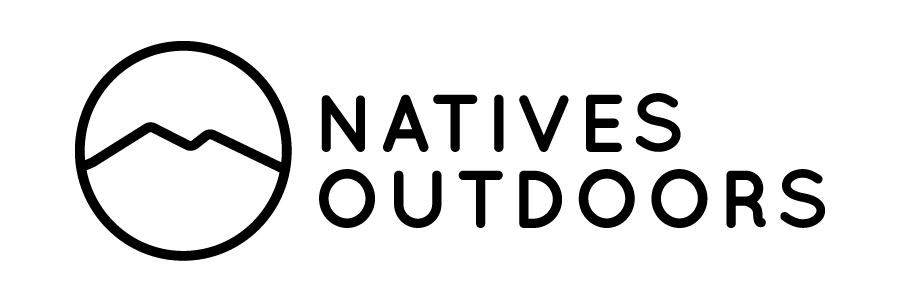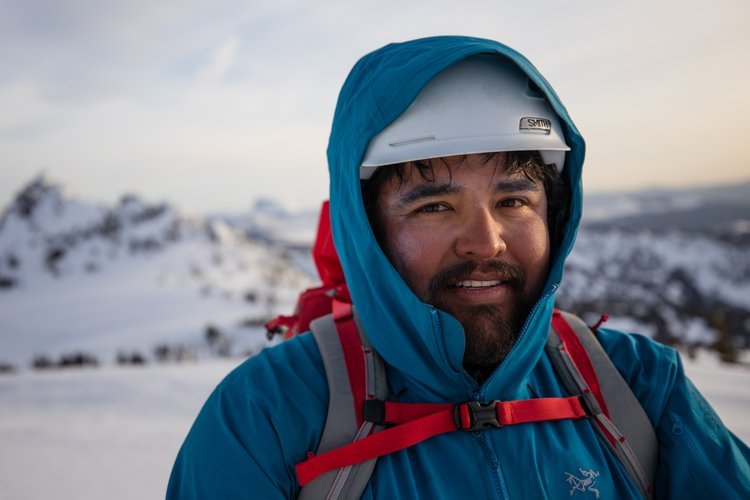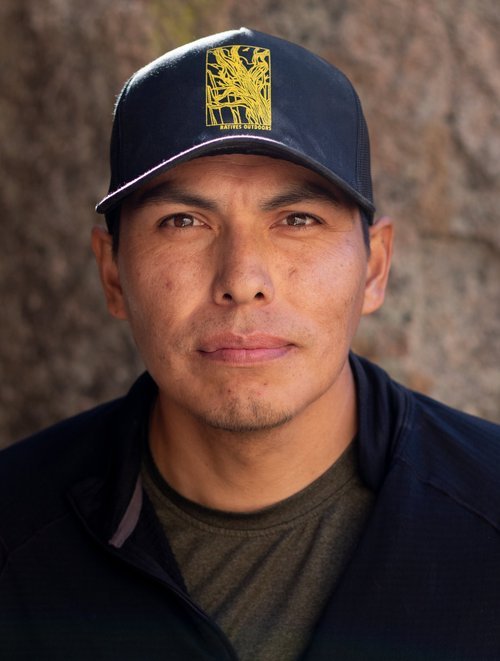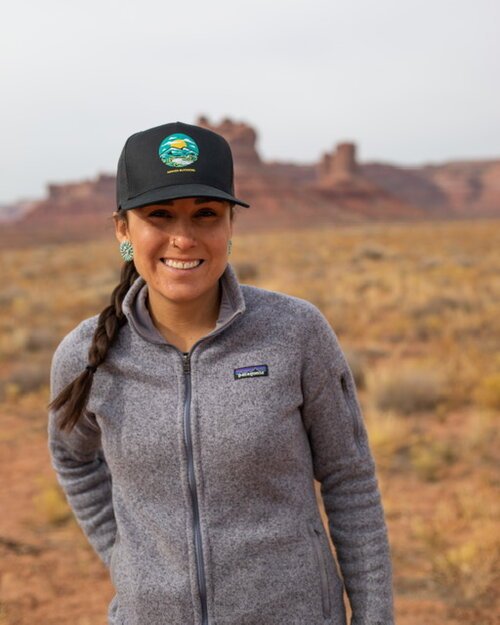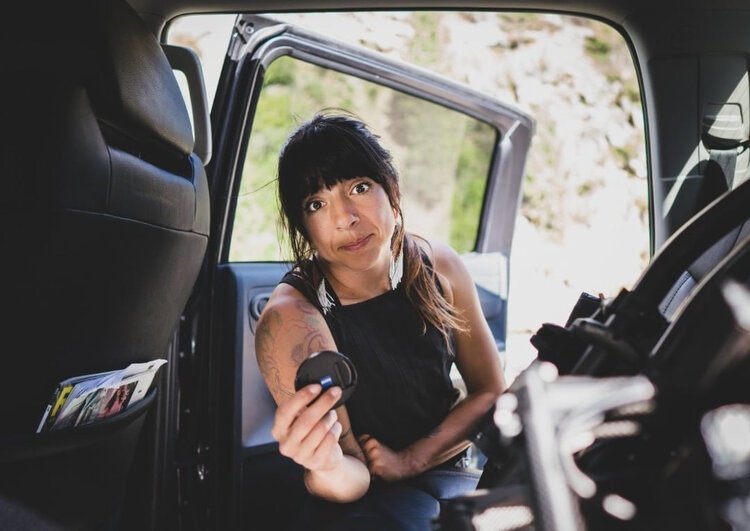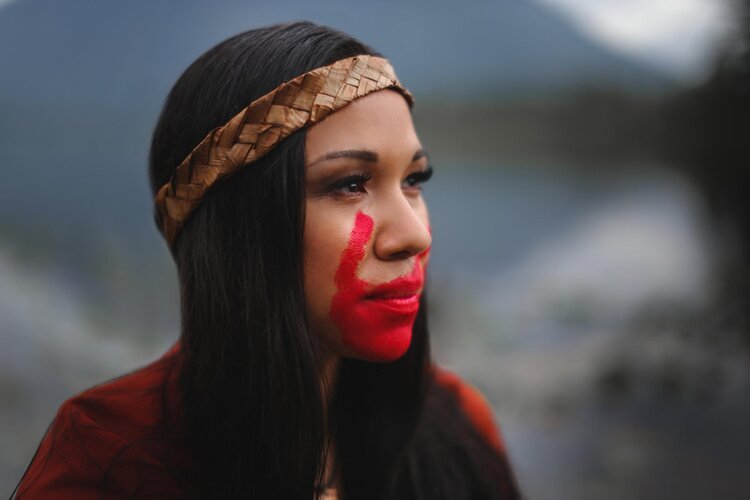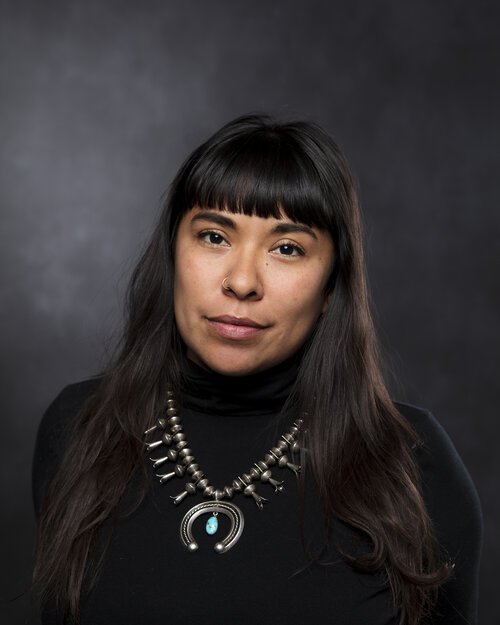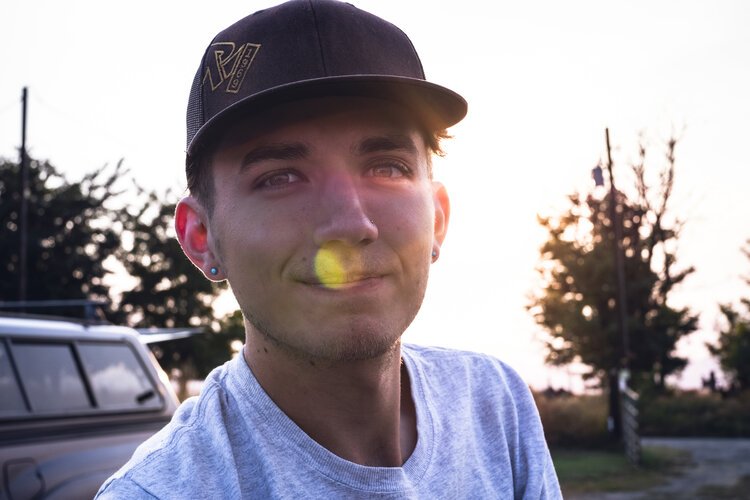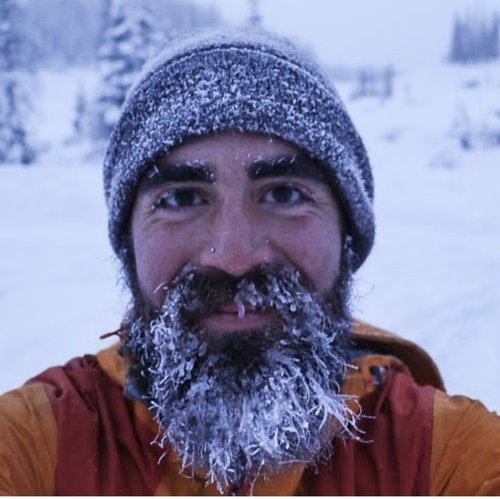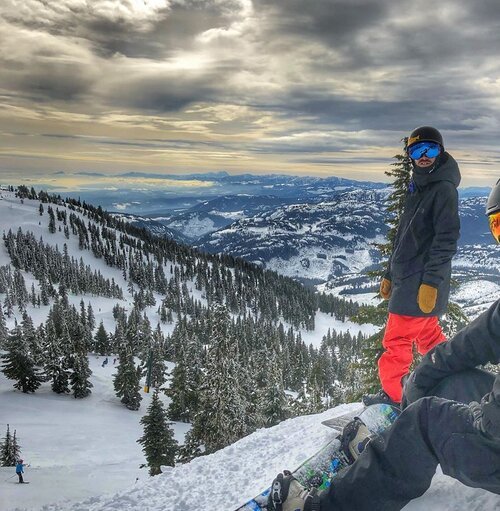This is who we are.
-
Founder
-
Artist and Graphic Designer
Yá'át'ééh my name is Vernan Kee. I am a Native American from the Navajo Nation, a USMC veteran, Graphic Designer and now a VanLife dog dad of six amazing pubbies.
At 20 years old I enlisted into the Marines to run away from alot of childhood trama and alcoholism in my family. That didn't go as planned and added more to a long list of problems. For years I struggled to to find my way and used mother nature to overcome those challenges.
I am now focusing my time and energy educating myself and others about traditional native lands, to respect these sacred places and hope to be a positive influence to the next generation.
Oh and I climb stuff, run up mountains, biking a new thing and do crazy rez kid stuff with my rez kid friends.
-
Running and Climbing Athlete
Yá’át’ééh or hello my name is Madison Dusseau. I am French and English on my mother's side and Navajo on my father's side. Sometimes I feel like I don't belong to this space, to claim my native heritage. I grew up off reservation and now as an adult I struggle with my identity as a Diné woman. My grandmother was one of the many who attended Indian Boarding Schools. The one she attended was in Riverside, CA and that is where she stayed after and raised her own family. She raised my dad and his 4 siblings without the language and culture that was stripped from her during her years in school. Therefore, I was also raised with very little knowledge about that side of my family.
Throughout life, I have always turned to the land whenever I have felt lost or overwhelmed. This journey has been no different. My time spent outside on the land is what makes me feel closest to my culture and ancestors and not such an outsider. So, as I navigate how I fit into these spaces I know I can always come back to the land. She will never make me feel like I don't belong or question how "Native I am" but welcome me as one of her own.
It is also my time spent on the land that has brought me to Natives Outdoors. My time getting to know my fellow ambassadors and being a part of this family has been extremely influential and inspiring during this time in my life. I am forever grateful.
Things that I hold close: Ian, my family, Tammy, my pups, my plants, coffee, fry bread, quality time with the people I love, and quiet time alone.
Things that I like to do: Climb rocks, ride my bikes, run various distances, jump into alpine lakes, stand on top of tall mountains, slide down mountains covered in snow, and all around just suffer fest-ing in the backcountry with good company.
-
Climbing and Running Athlete
Suzanne Trujillo lives in Portland, Oregon and loves climbing, running, hiking, and swimming in lakes. She is half Native from Laguna and Isleta Pueblos and half European, and she grew up off-reservation primarily near Portland. She spent childhood summers in northern Minnesota’s lake country with her European family and running around in New Mexico with her Native cousins. The outdoors have always called to her, but she didn’t have a strong connection to her indigenous heritage earlier in life. Since early adulthood, she’s been working to deepen that connection. She’s stoked about continuing on that journey and about supporting and celebrating indigenous communities.
-
Paul Robert Wolf Wilson is a photographer, cinematographer, Chief Storyteller at Rios to Rivers, LEAD Ambassador for the Northwest River Suppliers, and expedition athlete.
As a Klamath and Modoc photographer, he focuses his lens on the effects of the climate crisis on frontline indigenous communities and the lands and waters they have stewarded. After his first river trip on the Rio Baker in Patagonia, Paul and his sister started the Maqlaqs Paddle Club in Chiloquin, Oregon, to get more tribal youth onto our ancestral rivers in kayaks, he uses his storytelling and recreational platforms to rally public education and support around river stewardship- taking this struggle from local conversations all the way up to the United Nations Convention on Climate Change.
If he’s not on the river or at his desk, you can probably find him off-trail, struggle-busing with a backpack full of camera gear.
-
Filmmaker, Photographer and Climber
My name is Tara Kerzhner, I am a Photographer, filmmaker, and Rock Climber. I am both Nimiipuu (Nez Perce) and white. My grandmother, a Nimiipuu tribal member, died at the age of 26 from substance abuse. It has been new and complex for me to speak publicly about my indigenous heritage. This has been in part due to the pain that our family history has caused my dad, who was adopted as an infant. I struggle with my identity as an indigenous woman. My skin color (and how others perceive it) has played an active role in my life. I can't help but wonder what effect repeatedly being asked "what are you" and being told "you look so exotic" has played on my personal barriers surrounding identity. I guess that's where I'm leaning into my own discomfort. Because it's become the catalyst in my pursuit of advocacy within indigenous communities through story, images and film. I live in Boulder Colorado on Arapaho, Cheyenne and Ute land.
-
Climber, Hiker and Climate Advocate
Yá’át’ééh, hello, My name is Shaandiin Cedar, writing to you from a small van in Aotearoa New Zealand.
In the mid-1980s my mother traveled to Arizona to protest efforts against the forced relocation of Hopi and Navajo people and the leasing of new land and water resources for coal and uranium development. During this time, my mother met a smart young man who’s family lived at the epicenter of this land dispute, an area of Northern Arizona called Big Mountain, the heart of the Navajo Nation and their traditional homeland.
A few years later, I came along, Scotts-Irish and Cherokee on my mother’s side, and Chiishí and Naakai Dine’é on my father’s side.
Like a lot of families, mine was not always perfect. Alcoholism and addiction plagued family members. They dealt with health issues, racism, trauma, recidivism, abuse, land-based identity crisis’, and poverty, cycles that, as an adult, I understand better in historical context. There has also been great healing, breaking cycles through community support and personal triumph.
Which brings me to this moment. There is so much anxiety, tension and uncertainty in the world right now that It can be tempting to let cycles of fear and exhaustion defeat us. But we must move forward.
For me, this looks like engaging in advocacy work, protesting, protecting land and celebrating cultural identity like my parents did.
This looks like writing, starting hard conversations, often being the only brown person in the room and at the table, relearning the Navajo language, engaging in small and large acts of resistance, sustainability work, long hikes, climbing, laughing and contributing to work that shapes a future that’s just, equitable and ecologically sustainable.
In these ways I try to embody what it means to be a Diné woman, dedicated to having a positive impact, learning along the way and hoping to inspire others the embrace their communities, elders and the outdoors, powerful actions that create new cycles of healing and empowerment
Ahéhee', thank you, and see you out there.
-
Educator and Artist
My ancestral name is Kawaya7, my english name is @eckoaleck. I was born into the Nlaka’pamux nation, raised with the shishalh nation and currently live, work and play on the traditional territory of the Pentlatch nation.I am the owner and artist of @sacredmatriarch : digital and performance storytelling woven with ancestral knowledge. I am the daughter of a residential school survivor and cycle breaker for my 2 young sons.
Connecting to the land and water has been essential in understanding my identity as an Indigenous womxn/mother/artist. Grounding myself in my teachings and way of life - when I am able to physically connect I feel solid in who I am and what I offer this world.
My partner is fellow ambassador @recalma86, with our two children ages 7 and 2; connecting to the land through physical activity is necessary for everyone’s well-being! As a family we adventure outdoors with Tribal Canoe Journeys, hiking, climbing, bouldering, biking, snowboarding and paddle boarding while intertwining the knowledge we have of traditional harvesting and how our ancestors lived in harmony with Mother Earth.
kʷukʷscemxʷ
Ecko
-
Jade Begay, Diné and Tesuque Pueblo, is a filmmaker and an Indigenous rights and climate organizer. Jade has partnered with organizations like Resource Media, United Nations Universal Access Project, 350.org, Indigenous Environmental Network, Bioneers, Indigenous Climate Action, Allied Media Projects, and Tribal Nations from the Arctic to the Amazon to create multimedia, develop strategies, and build storytelling campaigns to mobilize and create more engagement and impact around issues like climate change, Indigenous self determination, environmental justice, and narrative change. Jade is the Climate Justice Campaign Director at NDN Collective building climate solutions on Indigenous terms.
-
Climbing Athlete
Yá'át'ééh shí éí Aaron Mike yinishyé (Hello my name is Aaron Mike) and I am a Diné (Navajo) NativesOutdoors rock climbing athlete based in Arizona. I have been climbing for roughly 15 years and have been recently integrating snow travel into my repertoire to hopefully do some fun objectives in the big mountains in the near future. My current work includes advocacy/ consultation at the intersection of public lands and Tribal sovereignty, as well as guiding for my company Pangaea Mountain Guides. My aspirations include combining my advocacy, education, and technical experience to assist Tribes in building sustainable and inclusive outdoor recreation opportunities. Additionally, I hope to improve public lands access through promoting and integrating Tribal traditional knowledge into management planning.
-
Ski Athlete
Hau mitakuye pi, I’m Connor Ryan, aka @sacredstoke on instagram, proud Hunkpapa Lakota and passionate skier. I was born and raised on the homelands of the Arapaho, Cheyenne, and Ute at the foot of the Rocky Mountains who are some of my biggest inspirations and closest relatives. I come from mixed heritages, Lakota and Irish, city life and wide open spaces, skiing big mountains and doing traditional ceremonies. I actively seek to decolonize, reconnect, and learn to better honor all my relations through my adventures and activism. Skiing is my dance and prayer, a ceremony of it’s own, one that offers a chance to center myself within nature and the Great Mystery of the universe surrounding me. It brings me in touch with the deepest gratitude for life, but also the most earnest humility within the landscape. The lessons I’ve learned in ceremony are reinforced by my relationship to the mountain. The traditional ecological knowledge that comes from Lakota culture helps me to understand the true value of the sacred land and water I ski on in deeper and more tangible ways. I’m a member of the @protectourwinters Athlete Alliance and am currently training for the @breakthebicylce ride for Black and Indigenous men’s mental health. My goal in life is to inspire others to deepen their connection to the places they live and play in order for us all to be better relatives to our planet, our communities, and ourselves.
-
Alpinist endurance junkie, 2020 Breakfast Foods Advocate, and Burger & Milkshake Enthusiast
My name is Calvin Smith, but you may call me Cal’. I come from the Lower-Cowlitz of Southern Washington and the Yakama of Central-WA. I grew up in the Yakima Valley of WA where my introduction to the outdoors was running track and cross country in high school. My passion for running quickly transcended into alpine sports such as ski-mountaineering, ice and alpine climbing. The places these sports brought me are not coincidentally sacred to Indigenous communities. Once I tuned into the connections all around me, I began interpreting my Indigenous identity through new perspectives, further understanding and questioning the intersections of being an Urban Indian. These new perspectives were nurtured in academic settings at the University of WA, where I earned a B.A. in American Indian Studies. My elders and mentors have taught me to share wisdom that has been gifted to me, an ethic which spurs fulfillment in my work guiding on Takhoma (Mt. Rainier). Although rewarding, I aspire to do more academically infused guiding with focus on Traditional Ecological Knowledge. My experiences mentoring at the Quileute Tribal School and Indigenous college students in the First Nations Club at UW have been formative mentorship roles; though, recent work has been focused on Diversity, Equity and Inclusion in the outdoor industry. Here, I aspire to empower the BIPOC community past, present and future for a more equitable and complete community. Collectively, as an educator and mentor, I aim to inspire personal growth spurred by education and interactions with the land.
Endurance running continues to be a primary focus and love of mine, though I find love and joy in ski-mountaineering and more recently, alpine and sport climbing. The places these sports have brought me are not coincidentally sacred to Indigenous communities. Once I tuned into the connections all around me, I began interpreting my Indigenous identity through new perspectives. Growing up, I never danced in powwows though most members in my family did. My two sisters, my mother and my three uncles. But never me. This tradition was something I would have to seek out for my own and adapt my own energy toward. A natural evolution of running in the streets and on the track has been to trails and now, mountain or ‘sky’ running. The feeling I get while running at the feet of Takhoma, I imagine is similar to the feeling of dancing in a circle of drums - a sense of belonging. In the past years of making new relations, I understand I am not the only Urban Indian craving this feeling. As my elders have taught me to share wisdom that has been gifted to me, I aspire to share these connections to land and place with other Urban Indians. Altogether, these intersections of outdoor education, decolonization and cultural identity are parts of my summer-time job as a mountain guide on Takhoma; where, I seek to revitalize the Indigenous narrative and presence.
-
With my photos and stories I look for loud and beautiful voices from all over, both human and more-than-humans, using my light box to paint a story. When I pick up my camera I wield it with compassion and consent, understanding that the stories of who we are and the images that come with are extremely personal. With explicit permission and reciprocity I capture frozen moments of expression both in ones face and in the world. My vocation is to share photos that cultivate a mentality of inclusivity, placing a particular focus to diversity in all spaces. Light is my art form and my way of representing voices that are often unheard or overlooked. In addition and in conjunction with telling stories, I am an Indigenous activist, environmentalist, humanist, geographer and athlete. When I am not traveling for my photo work I am visiting my family/friends in Colorado, Montana or out by the sea
-
Running Athlete
Lios em chaniavu, my name is Lydia. I grew up in Santa Fe, New Mexico (Tewa lands) and am a member of the Pascua Yaqui Tribe (Yoeme), Wixáritari (Huichol), and Greek.
I am currently finishing up my PhD at the University of Arizona in soil microbiology, where I study the soil health of reclaimed mining sites (i.e sites in the process of cleaning up their waste), and American Indian Policy, studying how modern mines consult tribal nations.
I’m passionate about soil health, amplifying Indigenous knowledge systems, and science communication. I do this work in an effort to best become a bwia yee ta’elia, (one who holds earth healer wisdom) for my community. It can be a lot of heavy material, so I am grateful for running and access to outdoor spaces as an important part in my self care. Aside from running, I love hiking, camping, am a sometimes climber, and am passionate about increasing Indigenous representation in outdoor and academic spaces (well, really everywhere!).Trail running has and continues to be one of the motivations for why I study environmental science. Running in Northern New Mexico, and now Southern Arizona, two places heavily impacted by the mining industry, led me to think deeply about the lands beneath my feet. Through running, I mastered my skills of observation about my environment, and in turn, my studies have helped me decode the stories of the lands I run to become a passionate advocate for the science of land stewardship practices.
I often ask myself: “Who’s land am I running on, what has been their practices of land stewardship that shapes the places I now experience, and how can I support them?"
I am also am ambassador for @wegotnextorg, working to amplify underrepresented stories of adventure and activism in environmental spaces, and 1/3 of the crew for @willrunforsoil, a group of soil scientists running to raise awareness about soil health.
-
Skiing, Climbing and Filmmaking
When I was four years old my grandfather taught me how to light dynamite. He was the son of an Irish miner and I inherited that history.
My mother's family is harder to trace. Like a long fuse, it winds through a bedrock of Hispanic and Ute and Navajo and Apache and Basque cultures. She teaches me traditional plant medicine mixed with Catholicism and feeds me food that is neither Basque nor Ute but is a fiery blend of both.
The explosion never asks if it's more fuse or dynamite. It is both and neither, and moves forward regardless. I have spent my life between the shattered cultural lines of the southwest where the only thing I can call myself is mestizo.
I now live at 11,700 feet in the San Juan mountains in the rebuilt ruins of a cabin. The land is my grandfather's old mining claim which is stolen Ute land. I am both the robber and the robbed, building on the foundational ruins of my elders, trying to find a way forward.
I use a camera to tell the stories of the people and land that I am from. I'm grateful to work with Natives Outdoors to continue telling the rich and complex narrative of the southwest.
-
Half-time gravity & sliding friction enthusiast and half-time science bear
My name is Ellen Bradley, KA Kein Shee, and I am a Tlingit skier from the Salish Sea. My grandmother is Martha Louise Bradley, Sey-ghe-gee, and my parents are John, Shawn-Yee-Kough, and Kelli Bradley of the Tlingit Ye'il Dogsalmon clan. I come from the People of the Tides, from a place where the Tongass-rainforest painted mountains meet the ocean, Lingít Aaní. I am an Urban Native, born and raised in Duwamish, Snohomish, Tulalip, Stillaguamish, and Coast Salish tribe territories. As an Indigenous scientist, I am interested in conducting Traditional Ecological Knowledge informed research to better understand our relationship with our more-than-human relatives. I find my greatest connection to my relations while spending time on the land skiing, diving, hiking, and tree climbing.
-
Educator, Climber and Snowboarder
My ancestral name is Malidas, it means a place where you never go hungry. I am Kwakwaka'wakw. My tax paying name is Steven Recalma from the Qualicum First Nation on Vancouver island, a small reserve located in the middle of Van Isle with about 98 on reserve members.
I am hugely motivated by high intensity sports, which is why I now coach/manage my own snowboard team up Mt. Washington. Getting involved in drugs and alcohol snowboarding was a way for me to escape and feel free and now I’m proud to be over 10 years clean and sober and this is a driving reason why I continue to coach and work with youth and make sure they have access to the sport. Because if not for the snowboard team and the generosity of the mountain donating passes, it would be super expensive for a lot to get up the mountain every weekend and have coaching/lessons.
I continue to snowboard, rock climb and skip ocean going canoes because I love the level of concentration I need to focus.
With COVID-19 I’ve noticed my mental health is declining and I find myself not doing the things I love. I’m starting to get back into it because it’s so important to take care of yourself, reground and reconnect with not only the land but yourself. If you can’t take care of yourself it’s so hard to help and take care of others.
Climbing and leading 5.12s and taking a two year break was huge and coming back from that long of a break you notice your mind set has completely changed. Starting over is not a bad thing, though.
Today, I have a family and continue to work with youth. When we’re teaching our kids how to harvest traditional medicines, plants, fish, and woodland creatures I am reminded of the importance of passing on this knowledge. Often we are too stingy with our knowledge, but it’s future generations that need it most.
